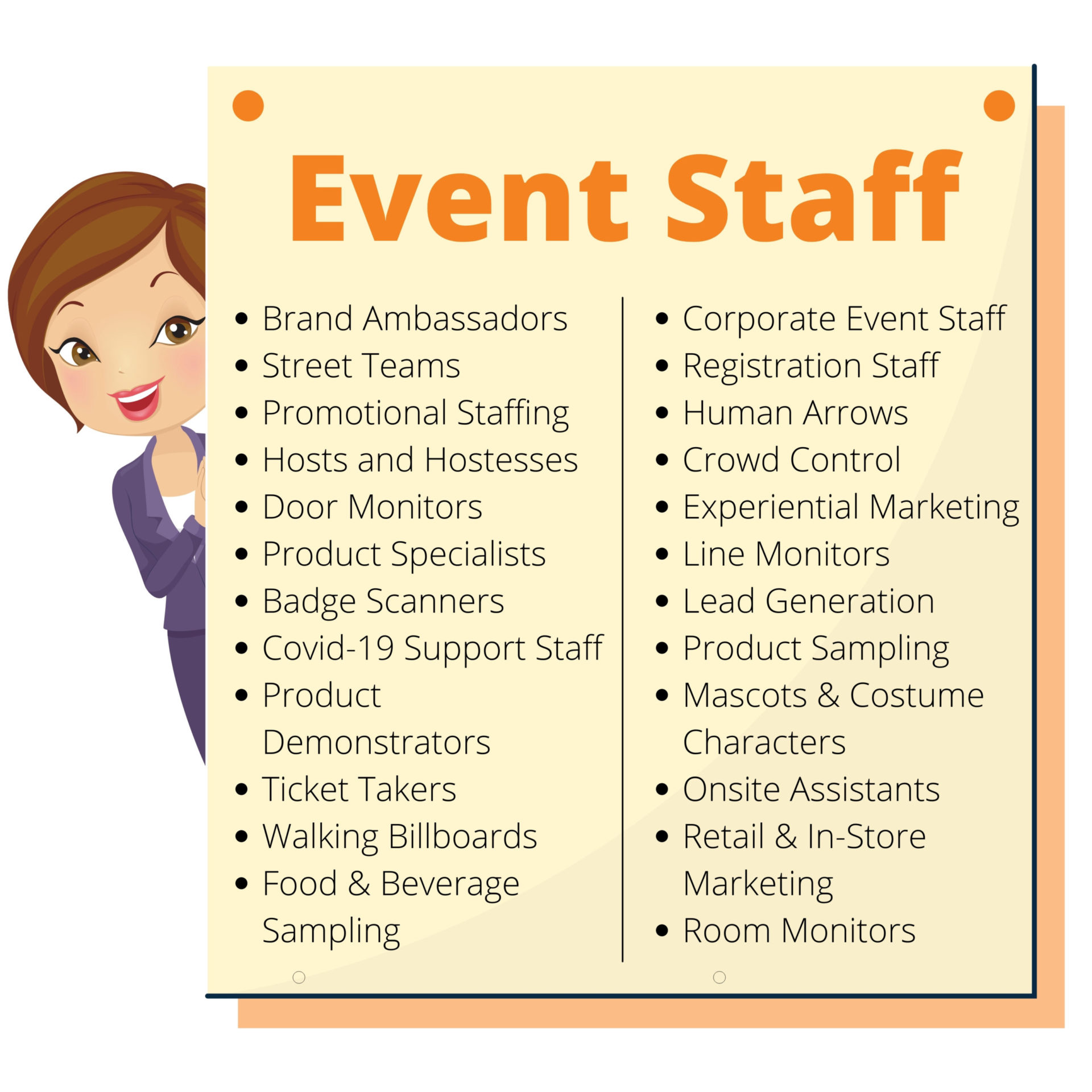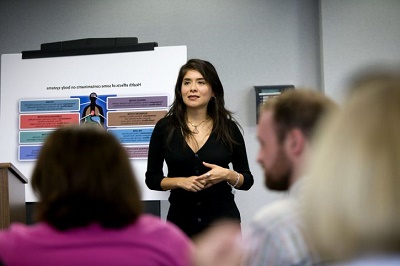What Does Event Staff Do?
Event staff are responsible for providing support and assistance in the planning, execution, and management of various events. They help with setting up and tearing down event venues, coordinating logistics, ensuring the smooth flow of activities, and addressing any issues that may arise during the event.
Event staff play a crucial role in ensuring the success of various events. From corporate conferences to music festivals, these individuals provide valuable support and assistance in the planning, execution, and management of all kinds of gatherings. They are the backbone behind the scenes, working tirelessly to ensure that every aspect of the event runs smoothly.
From setting up the venue and coordinating logistics to managing attendees and troubleshooting any technical problems, event staff have a wide range of responsibilities. We will delve deeper into the role and duties of event staff, highlighting the crucial tasks they undertake to ensure the seamless delivery of unforgettable experiences.

Credit: www.peopleready.com
Event Staff Roles And Responsibilities
When it comes to organizing a successful event, event staff play a crucial role in ensuring its smooth execution. From event setup to guest services and safety and security, event staff are responsible for a wide range of tasks and responsibilities. Let’s take a closer look at each of these event staff roles and responsibilities.
Event Setup
Event setup involves everything required to prepare the venue and make it ready for the event. Event staff are responsible for:
- Arranging furniture: Setting up chairs, tables, podiums, and other necessary equipment in the appropriate locations.
- Decorating the venue: Creating an appealing and visually pleasing atmosphere by arranging decorations, including flowers, banners, and signage.
- Setting up audiovisual equipment: Installing and testing sound systems, projectors, screens, and other technical equipment to ensure they work properly.
- Preparing the stage: Setting up the stage area, including backdrops, props, lighting, and curtains, based on the event requirements.
Guest Services
Guest services are vital for providing a positive experience for attendees. Event staff are responsible for:
- Greeting and directing guests: Welcoming guests as they arrive, providing directions, and assisting them with any inquiries or requests.
- Registration and check-in: Collecting attendee information, distributing name badges or event materials, and managing the check-in process.
- Assisting with seating: Guiding guests to their assigned seats and ensuring a smooth transition during the seating process.
- Providing information: Offering information about the event schedule, session locations, restrooms, and other facilities to help guests navigate the venue.
- Handling customer complaints: Resolving any issues or complaints raised by attendees promptly and professionally.
Safety And Security
Ensuring the safety and security of everyone at the event is a top priority. Event staff play a critical role in maintaining a secure environment by:
- Monitoring access points: Controlling entry and exit points to the venue, verifying credentials, and ensuring only authorized individuals are allowed.
- Conducting bag checks: Performing bag checks to ensure no prohibited items are brought into the event.
- Responding to emergencies: Being vigilant and prepared to address any emergencies or incidents that may arise during the event, including medical emergencies, fire hazards, or security breaches.
- Coordinating with local authorities: Collaborating with local law enforcement or security agencies to maintain a safe and secure environment.
Skills And Qualifications For Event Staff
Event staff play a crucial role in the successful execution of any event. They are responsible for ensuring smooth operations, managing guest interaction, and resolving any issues that may arise. To be effective in their role, event staff must possess a range of skills and qualifications that enable them to handle various situations with efficiency and professionalism.
Customer Service
Customer service is a key skill for event staff, as their primary focus is on attending to guests’ needs and providing a positive experience. Strong communication skills and an approachable demeanor are essential in order to interact with a diverse range of individuals attending the event. Event staff must be able to answer questions, provide information, and assist guests in a friendly and helpful manner.
Physical Stamina
Physical stamina is another important requirement for event staff, as their work often involves long hours on their feet, moving around to monitor the event space, and performing various tasks. They should also be capable of handling physically demanding situations such as lifting and moving equipment, arranging furniture, or assisting with event setups. This physical resilience ensures that event staff can work effectively throughout the duration of the event.
Problem-solving
Event staff must be adept at problem-solving, as they are often faced with unexpected challenges during an event. They must be quick-thinking and have the ability to assess situations, analyze potential solutions, and implement appropriate actions. Whether it’s resolving a seating issue, managing a technical glitch, or handling a guest complaint, event staff should be able to think on their feet and find efficient resolutions to maintain the smooth flow of the event.
Challenges Faced By Event Staff
Event staff face various challenges in their role, such as managing large crowds, coordinating logistics, and ensuring the smooth execution of events. They play a crucial role in setting up, organizing, and facilitating successful events, making them indispensable members of the event management team.
Handling Difficult Guests
Event staff often face the challenge of dealing with difficult guests. These guests may be unruly, demanding, or even aggressive, requiring the staff to maintain composure and diffuse tense situations. By employing active listening skills, empathy, and effective communication techniques, event staff can navigate these encounters successfully. They must remain calm and ensure the safety and satisfaction of all attendees without disrupting the event’s flow.Managing Time And Priorities
Another challenge faced by event staff is managing time and priorities. They need to juggle various tasks simultaneously to ensure the smooth running of the event. This includes setting up and organizing event spaces, coordinating with vendors and performers, greeting guests, providing assistance, and addressing any issues that may arise. Prioritizing tasks effectively is crucial in order to meet deadlines and deliver a memorable experience for attendees. Additionally, event staff must be prepared to adapt and make quick decisions in dynamic situations. Overall, the role of event staff is multifaceted and presents various challenges. By handling difficult guests with tact and professionalism and managing time and priorities efficiently, event staff can contribute to the success of any event.
Credit: parim.co
Tips For Successful Event Staffing
When it comes to successful event staffing, there are a few key tips that can ensure a smooth and well-executed event. Effective communication, teamwork, and adaptability are three crucial qualities that event staff need to possess. In this section, we will discuss each of these qualities and how they contribute to the success of an event.
Effective Communication
Good communication is vital for event staff to execute their tasks efficiently. It allows them to understand their responsibilities, coordinate with team members, and respond promptly to any issues or changes that may arise. By maintaining clear and concise lines of communication, event staff can ensure that everyone is on the same page and working towards a common goal.
Here are some ways event staff can improve their communication skills:
- Active listening: Pay attention to instructions and information given by superiors or clients.
- Clarity of speech: Speak clearly and concisely when conveying information or instructions to team members.
- Non-verbal cues: Pay attention to non-verbal cues to understand and convey messages effectively.
- Using tools: Utilize communication tools such as radios or mobile applications to stay connected with team members.
Teamwork
Successful event staffing relies heavily on teamwork. Each member of the staff plays a vital role in the overall success of the event. Collaboration and cooperation among team members lead to efficient execution of tasks and seamless event operations.
Here are some ways event staff can enhance their teamwork skills:
- Clear roles and responsibilities: Ensure that each team member understands their specific roles and responsibilities within the team.
- Supporting one another: Offer assistance and support to fellow team members when needed.
- Open communication: Foster an environment where everyone feels comfortable sharing ideas and concerns.
- Resolving conflicts: Address any conflicts or issues that arise within the team promptly and professionally.
Adaptability
Event staff need to be adaptable and flexible to navigate the ever-changing dynamics of event management. From unexpected changes in schedules to unforeseen challenges, being able to quickly adapt and adjust is crucial for ensuring the event’s success.
Here are some ways event staff can cultivate adaptability:
- Flexibility: Be willing to take on new tasks or adjust existing ones as needed.
- Problem-solving skills: Think critically to find solutions to unexpected challenges.
- Ability to handle stress: Remain calm under pressure and effectively manage stress-inducing situations.
- Continuous learning: Stay updated with industry trends and best practices to adapt to changing demands.
Future Job Trends In Event Staffing
Event staffing is a growing job trend in the future, with professionals providing various services like event planning, ticketing, crowd control, and guest coordination. With the increasing demand for well-organized and successful events, event staff play a crucial role in ensuring everything runs smoothly.
They are responsible for creating memorable experiences for attendees and ensuring the success of any event.
As technology continues to advance, the event staffing industry is also experiencing a wave of changes. These future job trends in event staffing are driven by the need to embrace technology and enhance training programs to meet the evolving demands of the industry. As event staff members play a crucial role in ensuring successful events, it becomes important for them to adapt to these changing trends. Let’s explore some of the key trends shaping the future of event staffing:
Technology Integration
One of the significant future job trends in event staffing is the increasing integration of technology into event operations. Technology has revolutionized the way events are planned, executed, and managed. It has made event coordination more efficient and streamlined, enabling event staff to work more effectively. With the rise of mobile event apps, event staff can access real-time information, communicate seamlessly, and resolve issues promptly. Technology also allows for better event analytics, helping event staff to make data-driven decisions and improve overall event experiences.
Enhanced Training Programs
In order to keep up with the evolving demands of the event industry, enhanced training programs are becoming a crucial aspect of event staffing. These programs aim to equip event staff with the necessary skills and knowledge to excel in their roles. Today’s event staff need to be well-versed in various areas, including customer service, problem-solving, and effective communication. Training programs that focus on these competencies ensure that event staff can handle diverse situations and provide exceptional experiences to event attendees.
In addition to the essential interpersonal skills, event staff are also required to be proficient in using event management software and tools. Training programs are now incorporating modules that cover these technological aspects to enhance the efficiency of event operations. This combination of interpersonal and technical skills enables event staff to meet the demands of the modern event industry.

Credit: adamchristing.com
Frequently Asked Questions For What Does Event Staff Do?
What Does Event Staff Do At An Event?
Event staff is responsible for various tasks such as managing registrations, assisting attendees, setting up and dismantling event spaces, and ensuring a smooth flow of activities.
How Do Event Staff Help In Managing Events?
Event staff play a crucial role in managing events by overseeing logistics, coordinating with vendors, providing customer service, handling emergencies, and ensuring the event runs smoothly.
Why Is Event Staff Important For A Successful Event?
Event staff are essential for a successful event as they handle essential tasks, ensure the needs of attendees are met, and handle any unexpected situations that may arise, allowing the event to be efficiently organized and enjoyable for all.
Conclusion
Event staff play a crucial role in ensuring the success of any event. From managing logistics to coordinating schedules, they work behind the scenes to make everything run smoothly. Their attention to detail and ability to handle unexpected challenges are invaluable.
Whether it’s a corporate event, conference, or concert, event staff are the unsung heroes who ensure a memorable experience for attendees. Their dedication and hard work contribute to creating a seamless and enjoyable event for everyone involved. So, the next time you attend an event, take a moment to appreciate the efforts of the event staff who make it all possible.



